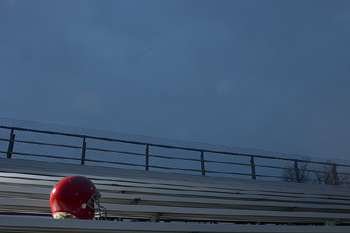The civics lesson continues for Sobrato High School students who
want their own football stadium, but the senior leading the effort
wants to see more action and less talk.
The civics lesson continues for Sobrato High School students who want their own football stadium, but the senior leading the effort wants to see more action and less talk.
San Jose City Councilman Ash Kalra, who represents the region of the city that abuts Sobrato’s campus, spoke to two senior civics classes in the school’s performing arts center Friday.
For about an hour, passionate students who long for their own stadium in which to welcome visiting teams asked Kalra incisive questions about the web of laws, agreements and political relationships they will have to untangle in order to get what most high schools have.
“You’re stuck at the ground level on a much greater policy issue,” Kalra told the students.
Kalra said he does not plan to support a stadium on the area of the school’s campus where the bleacher-less football field now sits, adjacent to the campus but just over San Jose’s city-limit line. Kalra represents the south San Jose district where the field is located.
“I’m willing to keep an open mind and discuss the issue,” Kalra said. “It would be inappropriate for me to take a stand.”
Aside from being outside Morgan Hill’s and the local school district’s jurisdiction, the property where students want to see a stadium lies in the Coyote Valley Greenbelt. Strict guidelines protect the greenbelt from development and high-impact uses. For example, permanent structures and high-intensity lighting are prohibited in the greenbelt, which has to remain clear for unimpeded movement of wild animals through the east-west habitat corridor, Kalra explained.
He said although some of the development rules “seem silly or too sensitive,” he and the city of San Jose have no choice but to follow them. Plus, if they don’t think about the long-term effect of dense development, San Jose could end up like Los Angeles with unchecked sprawl.
“We have to hold firm on these issues. If you start making exceptions it causes problems,” Kalra said. “I’m holding the line on hillside development in my district (for example). San Jose is not trying to be the big bad neighbor. It’s about being responsible now.”
He further explained that if his city were to grant Sobrato High an exception to greenbelt restrictions, neighboring property owners in Coyote Valley who are waiting to make “millions and millions of dollars” on development would have a stronger argument to seek their own variances.
Sobrato civics teachers Howard Barnes and Jeff Bernstein invited Kalra to talk to the students about local government and their effort to gain regulatory approval for a new stadium structure.
The students, led by senior Vicky Perry, began that effort in December, when they collected more than 900 student signatures indicating their support for their own home field. Since the school opened, the Bulldogs football team has played its home games at Live Oak High School on Main Avenue.
Morgan Hill Mayor Steve Tate has indicated his support for a football stadium at Sobrato High, as well as for a 15-field soccer complex by the city of San Jose on nearby property which could be accessed from the high school. That complex was proposed in December, shortly after the student-led stadium campaign began.
Morgan Hill Unified School District officials have indicated if they could gain approval for a new stadium, the cost right now is prohibitive. The district has cut more than $8 million from its budget the last three years due to declining revenues.
Even if they had the money, the district would have to convince the city of San Jose to get out of an agreement made in 2001. in a settlement of a lawsuit brought by San Jose, the school district agreed never to build permanent facilities or install outdoor field lights on MHUSD property in San Jose.
Kalra said he has not participated in any formal discussions about a stadium among the influential parties, and is not aware of any such discussion having taken place.
Perry recognizes now that the students, most of whom are ineligible to vote, have illustrated their support, they need to convince their local officials. The students are hoping to schedule a meeting with MHUSD Superintendent Dr. Wes Smith in the near future, and are encouraged by the mayor’s support, Perry said.
“I like the challenge,” Perry said after the civics lesson. “I know it’s a lot of work. It’s also something myself and Sobrato High School students are passionate about. Knowing I went through high school without that experience, somebody has to get the ball rolling.”
She was hoping Kalra would offer more hope Friday. “He didn’t really give us a direct answer on what we need to do to get his support,” she said.
Kalra said he was impressed with the students’ questions and their understanding of the complex issues involved with building a new stadium.
Although he is unlikely to support the students’ stadium effort, Kalra advised them on how to surmount political obstacles such as his own opposition.
“Let (local officials) know that you’re not doing this for yourself – you’re doing it for your brothers and sisters and future generations,” Kalra said. “They should have foreseen that this would be an issue. You’re hitting the point now where the (new) school is part of the community. Express how important this is to you.”








